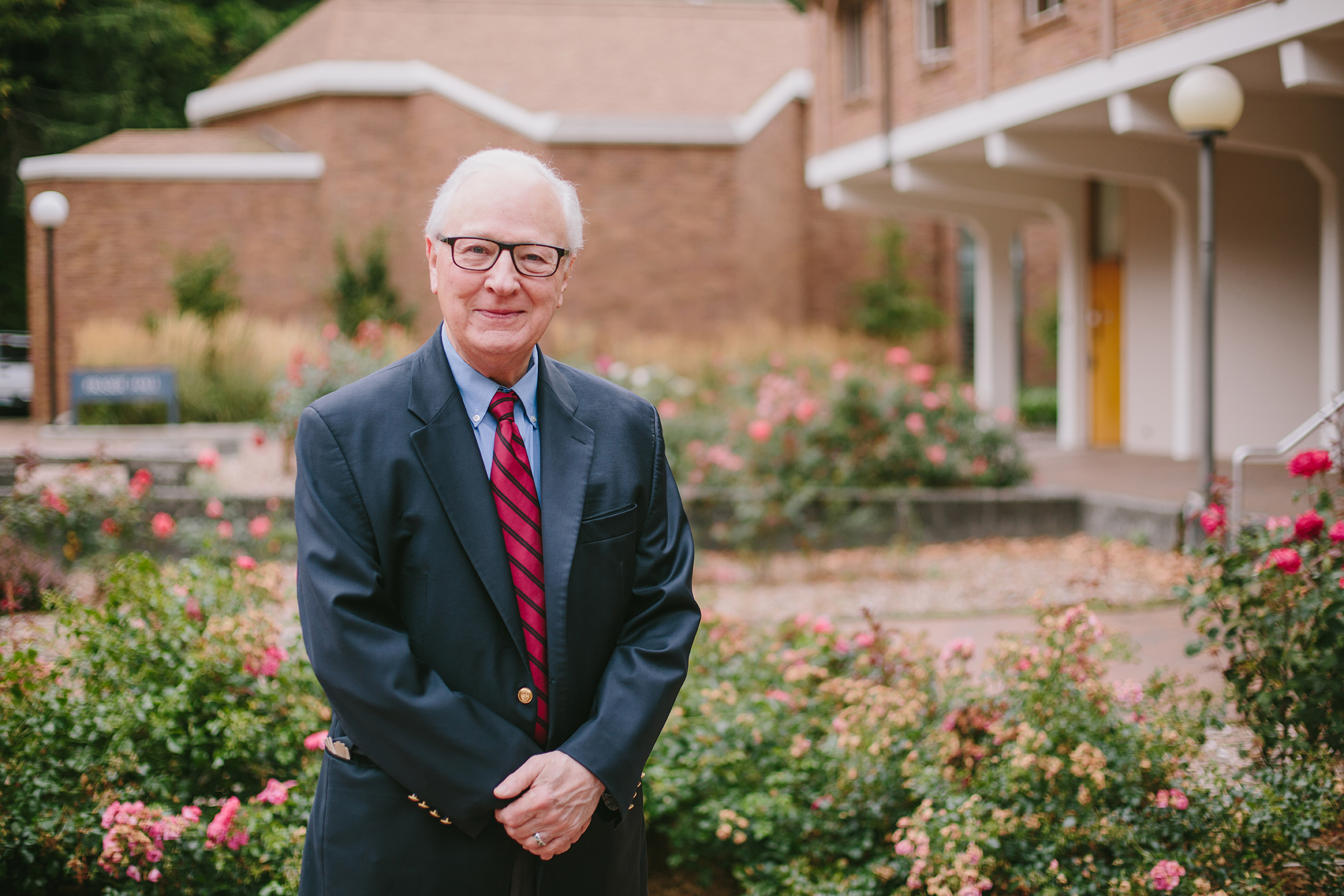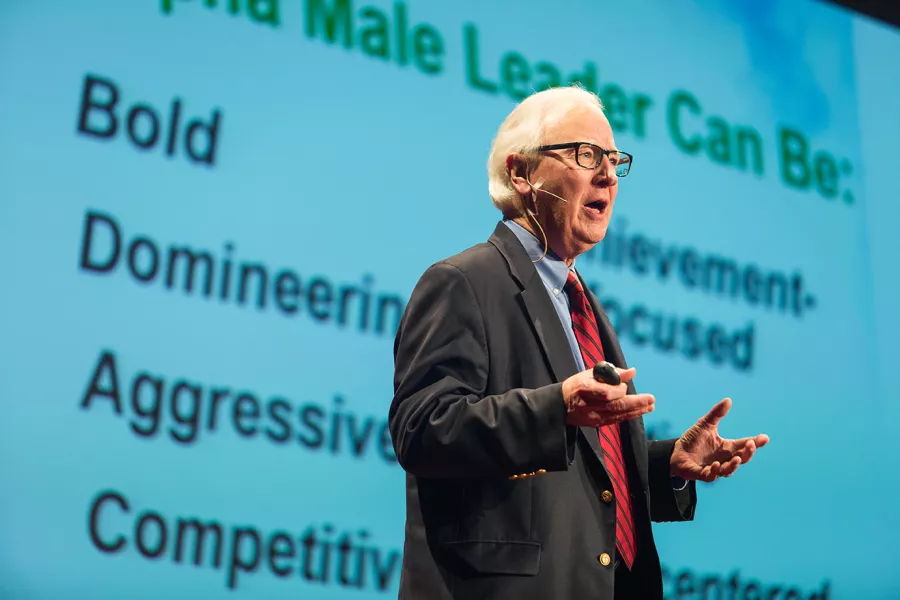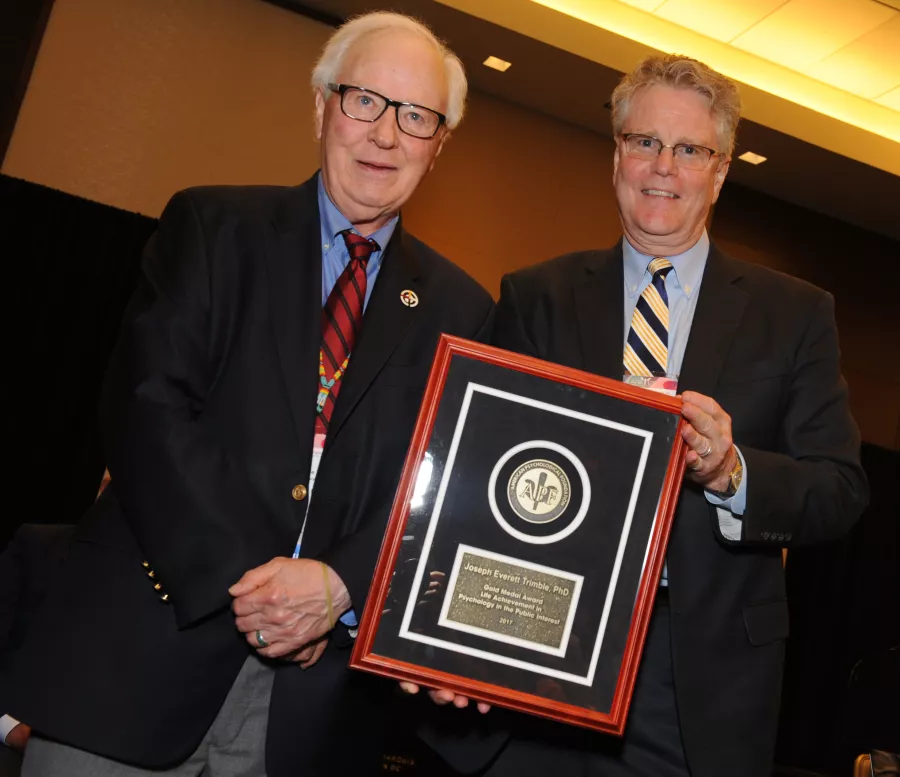Ten minutes before class on a dreary February morning, Joseph E. Trimble, Distinguished University Professor and professor of psychology at Western, was pulling together lecture notes and a few PowerPoint slides in his office on the top floor of the Academic Instructional Center.
The desk phone rang, and he wasn’t going to answer. But the caller ID said “Washington, D.C.,” so he decided to pick up.
The American Psychological Foundation was calling to tell Trimble he had been awarded the 2017 Gold Medal Award for Life Achievement in Psychology in the Public Interest.
The foundation is the philanthropic arm of the 117,000- member American Psychological Association, the nation’s largest scientific and professional organization for psychologists. And they were giving him an award whose citation would begin: “Joseph Everett Trimble is one of the most extraordinary psychologists in our profession.”
Once some of the shock wore off, Trimble recalls, he politely excused himself from the call so he could go teach.
“I was in a daze for most of my class, and I had to often pinch myself that what I heard was actually true,” he says.
Trimble accepted the award in August at the American Psychological Association national convention in Washington, D.C., while an audience of about 200, including colleagues, family, friends and former students, looked on.
This award is by no means Trimble’s first recognition. Awards line the walls and cover the bookshelves in his office, including four from Western, honoring his teaching and scholarship.
Trailblazing career
In the citation for the lifetime achievement award, Trimble is recognized for being an “unquestioned leading contributor in the field of psychology and the American Indian.”
“Besides his expertise in indigenous issues,” the citation continues, “he is a recognized authority in multicultural psychology.”
Trimble’s work with multicultural populations arose from a curiosity about how group and cultural influences were accounted for in psychology, which had been regarded as a singular pursuit to understand the minds of all individuals. Our minds, according to the prevailing wisdom of the time, all worked the same—or the same as a white male’s—regardless of our genders, ethnicities, upbringing and experiences.
Trimble wasn’t having it.
“Culture matters in all aspects of our lives,” Trimble says, but psychology as a discipline hadn’t yet come to that realization in the mid-1960s when he began exploring the idea as a graduate student at both the University of New Hampshire and Harvard University. For him, this notion of culture intimately tied to the individual was an epiphany that would propel him for the rest of his career.
Trimble has tackled matters of mental health, substance abuse and spirituality in his work, not only in academic research but also in helping to create counseling protocols that acknowledge cultural differences. His work has also shaped public policy, and opened the psychology community’s eyes to what had been a gaping hole: the understanding of culture’s influence on each of our lives.
Today, the American Psychological Association now recognizes multicultural approaches to understanding the human condition as integral to the profession.
Trimble’s choice to work with American Indian and Alaska Native cultures took root during his doctoral studies in the social psychology program at University of Oklahoma. The program fostered some of the ideas he’d been eager to understand, but perhaps more importantly, it gave him the opportunity to spend time with the families of friends he made at the university, including members of many of the local Native American tribes.
As he saw the people in these communities struggle with problems such as prejudice, poverty and alcoholism, he realized he couldn’t get too absorbed in textbook psychology and should instead use his cultural knowledge to help in “solving fundamental social problems.”
He continues with this quest today, still researching, writing and speaking on the intersection between psychology and culture. His recent work explores subjects including advances in culture, ethnicity and race; counseling psychology and culture; diversity and leadership; ethical mental health interventions for indigenous populations; and disparities in mental health problems among American Indians/Alaska Natives in comparison to other Americans.
“He has been an advocate for addressing the needs of ethnic minorities within a profession and society where they are often overlooked or marginalized,” says Jean Lau Chin, a psychology professor at Adelphi University in New York, and the co-author with Trimble of two books about leadership.
“He brings the conscience to ensuring that we remain aware of our ethnocentric biases,” she continues, “and the commitment to promoting a psychology that is inclusive, respectful of differences, and culturally competent within our profession and society.”
Championing culture and diversity
In 1979, a decade after completing his graduate studies at Oklahoma and still hungry for an academic department that accepted the notion that culture mattered in psychology, Trimble came to Western Washington University.
He was attracted by the Psychology Department’s Center for Cross-Cultural Research, whose focus on the intersection of culture and psychology was groundbreaking at the time.
“That was not happening anywhere—anywhere—in the world,” Trimble says.
The center, and its Journal of Cross-Cultural Psychology, continue to be a bellwether in the field, and the idea that “culture matters” has become woven into the fabric of the Psychology Department.
This awareness and appreciation is not isolated to the Psychology Department, Trimble notes, but runs throughout the university, and comes directly from the student body.
“Our students are saying, ‘We need to talk more about cultural diversity, and we need to learn more about it when we’re freshmen,” Trimble says, adding that students are telling faculty they want to understand the differences of people worldwide, how they live, how they think, how they cope.
Just days before, a deadly white supremacist riot in Charlottesville, Virginia, had illustrated the consequences of what can happen when people don’t learn about cultural diversity.
“Suffice it to say, what happened in Charlottesville,” Trimble sighs, “horrible. Unacceptable.”
Yet he still finds there is hope as people take a stand against racism, across the country and at Western.
“I share this vision with countless colleagues and friends, and I take a great deal of comfort to know that it’s an ongoing, daily conversation filled with passion and commitment to bringing about change for the better,” he says.
Mentorship & collaboration
Trimble remembers the names and stories of countless students— many of whom came to Western as graduate students specifically to study with him.
“I have had wonderful students who have gone on to do wonderful things,” he says. “That in and of itself is more valuable to me than any other part of my profession.”
One student who appreciated Trimble’s mentorship in the 1980s is Trula Nicholas, who is now a fellow faculty member as an associate professor of Human Services at Western. It wasn’t just the grant Trimble pointed her toward that paid for Nicholas’ second year of graduate school, but also the way he made her feel welcomed.
Nicholas, who earned her bachelor’s and master’s degrees in psychology at Western in 1985 and 1987 respectively, explains that psychology as a field is not always welcoming to people who are outside the mainstream. As a person with a multicultural heritage, Nicholas says, having “someone who understood that was really important,” she says of Trimble.
She noticed how Trimble made her and other students feel welcomed, for instance, introducing her to another student of color in the class. That feeling of belonging sets the stage for students to do the best they can, she says.
Today, Nicholas is the one creating welcoming spaces for students, an example set by Trimble. She’s also carried his passion for equity and social justice into her own teaching, her research and her work in the community. In 2016, Nicholas and Trimble shared Western’s Diversity Achievement Award.
“Being able to zero in on social justice topics was unusual (in psychology),” Nicholas says. That focus in her studies excited and emboldened her to keep pursuing those topics.
More recently, Genavee Brown (‘14, M.S., experimental psychology) came to Western after earning a bachelor’s degree at Wake Forest University in North Carolina because she wanted to study cross-cultural psychology. Western is one of the only places where students can be advised by experts in the field, such as Trimble, she says.
Trimble served as Brown’s adviser for her master’s thesis project, which revolved around friendship and cell phone use. Trimble encouraged her to publish the results, which were printed in a top peer-reviewed psychology journal.
Brown says Trimble encouraged her to develop her own interests by talking with other faculty members and diving into articles in different areas of social and cultural psychology.
“This allowed me to ... develop my own ideas about what sort of research I could be passionate about and pursue throughout my career as a researcher,” she says. She continues her research into how culture influences technology use as a doctoral student in France at the University of Rennes 2.
Mentorship of his students is a key driver for Trimble, as is collaboration with colleagues at Western and around the world.
One of his recent collaborations is with Chin of Adelphi University. The two published “Diversity and Leadership” in 2015, and Trimble gave a TEDx Talk on the ideas in the book at TEDxWWU that same year.
Trimble loved the TEDx experience. Organizers had all the speakers – even experienced lecturers like Trimble – meet with a drama coach and a speech coach beforehand.
The day of the event was exhilarating. “The PAC was packed on a Saturday. Packed!” Trimble remembers.
The talk and the book examine how people in different cultures lead in many effective ways. In Trimble’s TEDx Talk he declares, “Bid farewell to the alpha male leadership style.” Trimble himself, Chin says, embodies the values of the cultures he has spent so many years learning about.
On the cover of Chin and Trimble’s book is an image of origami cranes of many different colors flying together to create the globe. Trimble says he hopes he can make that idea relatable to students and to those who care deeply about the future of our relationships with one another.
“Certainly, my goal is to have them understand that culture matters in the lives of all people, so much so they don’t even think about it,” he says. “We can foster an understanding of these differences and come to appreciate these differences and learn from them. And maybe even embrace them.
“Those birds coming together form a beautiful place for us.”
Trimble and Chin will publish three more books on the topic of leadership and diversity in the next few years, starting with “The Culturally Diverse Leader: New Dimensions, Opportunities and Challenges for Business and Society,” published in October by SAGE Publications. Retired Western management Professor Joseph Garcia (’75, M.A., psychology), the first director of Western’s Morse Leadership Institute, also collaborated on the book.
So far, Trimble has published over 150 journal articles and book chapters, 22 books, close to 100 technical reports and presented over 200 lectures and presentations at regional, national and international conferences. His CV is a small book unto itself.
And nearly 50 years after completing his doctorate, Trimble doesn’t show signs of stopping. He’s spending the next several months in Scotland as a visiting scholar in the School of Psychology and Neuroscience at the University of St. Andrews, where he’s gathering perspectives from culturally diverse leaders from around the world. Plus, he’s collaborating on yet another book series on culture, ethnicity and race in social and behavioral sciences.
Trimble doesn’t dream of retirement because, he says, what he does isn’t work.
“Work is hard. Work to me is like digging rocks in a garden. That’s work,” he says.
Instead, Trimble is free to think, study and connect.
“I can read, write, interact with people from all over. What more can I ask for?”


